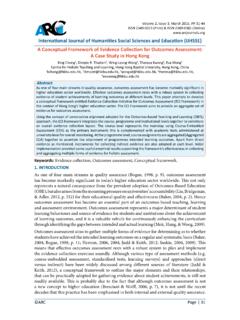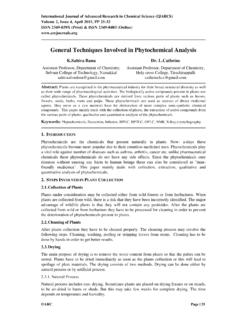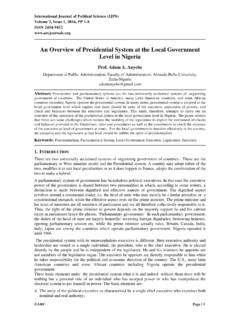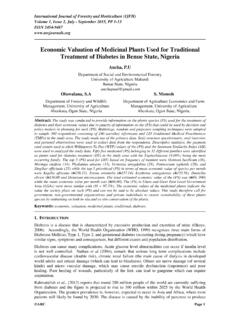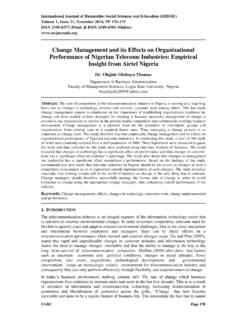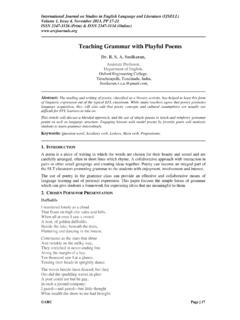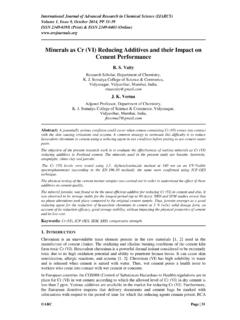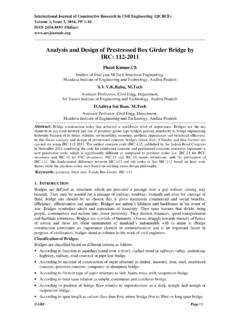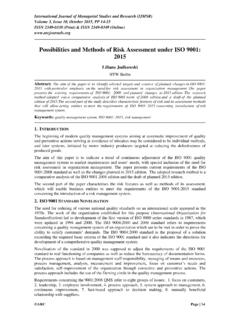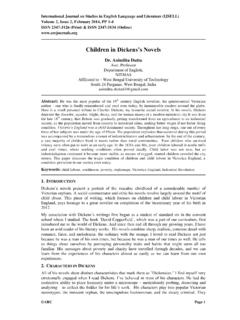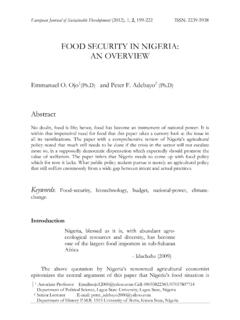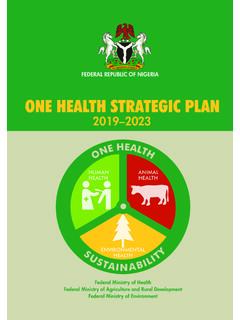Transcription of The Influence of Media Ownership and Control on Media ...
1 International Journal of Humanities Social Sciences and Education (IJHSSE) Volume 1, Issue 7, July 2014, PP 36-45 ISSN 2349-0373 (Print) & ISSN 2349-0381 (Online) ARC Page 36 The Influence of Media Ownership and Control on Media Agenda Setting in nigeria Okafor Godson Okwuchukwu (PhD) Department of Mass Communication, Nnamdi Azikiwe University, Awka- nigeria Abstract: This study assessed the Influence of Media Ownership and Control on Media agenda setting using nigeria as a case. The core method of data collection in this study was in-depth interview.
2 The sampling methods employed include the Cluster sampling and the purposive sampling since the data expected requires an in-depth knowledge of the Nigerian Media landscape. The finding of this study revealed that different levels of government in nigeria which comprises of state and federal governments, serving and retired high level public and private officials, politicians, as well as influential businessmen and women, own most of the Media organizations in nigeria . It was observed that these groups of people (the ruling elite) are the core news makers whose views and opinions populate most of the views, news, opinions and information disseminated in the Media in nigeria .
3 The findings further showed that the current Media Ownership pattern and the level of Media Control in nigeria actually hinder the Media from independently setting society s agenda. Keywords: Government, In-depth interview, Media , News, Politicians, Private officials 1. INTRODUCTION The Media and communication are closely related. It is the ability of the Media to give salience, importance or prominence to an issue while de-emphasizing or ignoring others in the process of communication that gives the Media its agenda setting capability. The relationship between the Media and communication is so inextricable that one cannot begin to appreciate any without knowledge of the other.
4 In contemporary society, the prerequisite for relating to and understanding the wider world have been narrowed to the effective use of information communicated through the Media . Moreover, the enormous opportunities available from being part of the global village have become conceivable only because of innovations in information and communication technology which in turn have democratised Media information. A general discussion of the Media involves all the communication technologies that brought with it the transformation of the Media and paved the way for the remarkable democratization of information today.
5 Among recent developments in information and communication technologies are digital electronic audio and video devices, the World Wide Web (WWW), broadband, social networks, Internet ready devices like smart phones, tablets, as well as mobile internet etc. These modern communication technologies have inadvertently democratised access to information and are today deployed both in nigeria and elsewhere to facilitate communication and/or information dissemination. Many Media scholars and experts in nigeria , Africa and indeed around the world agree that the Media have some form of impact, Influence and/or effect on its audiences.
6 However, the direction, nature and extent of this Influence , impact and/or effect remains a source of disagreement. In his own view Edie (2001) noted that the mass Media all over the world have established themselves as a new channel - a third channel for political, (social and economic) Influence - and in many aspects also as an independent power broker. Thompson (1995) believes that the Media have played a central role in the development of modern institutions. In contrast, Kupe (1999) claims that in the African scenario the Media have always been peripheral to the lives of most people in the continent.
7 But Tettey (2001) argues strongly that the Media are among the forces that have shaped, and continues to define the establishment of democracy in Africa. Okafor Godson Okwuchukwu (PhD) International Journal of Humanities Social Sciences and Education (IJHSSE) Page 37 Daily, individuals across the globe are constantly exposed to information, ideas, news, advertisements, messages and ideologies from different Media sources in the cause of their daily activities. in nigeria , citizens have access to all sorts of Media information ranging from; radio, television, cable and satellite broadcasts, the Internet both broadband and mobile internet, social networks, smart and ordinary mobile phones, digital audio or video devices, newspapers, magazines, periodicals, journals, books, cinemas, etc.
8 One may then ask, why humans of all ages willingly expose themselves to this almost overload of information? One may equally answer that by its very nature the Media helps members of society (humans) to make sense of their world . In addition, the Media also have functional roles in the political, social and cultural structures of society including surveillance by acting as society s watchdog and directing members of society to important societal issues. Olayiwola (1991) explained that the Media provides news and sets the agenda for political, social and cultural discourse. It is important to note at this point that the sourcing of news and information in the Nigerian Media has its peculiarities.
9 These peculiarities render it incorrect to argue that issues canvassed in the Nigerian Media and discussed in the Nigerian public sphere is the agenda of the Media . Much of the local news and/or information disseminated in the Nigerian Media originate from the ruling class who are referred to in the Nigerian Media parlance as news sources . News sources in nigeria are dominated by the ruling class or petty bourgeois who are tagged news makers . This class of individuals includes politicians, business executives, captains of industry, top civil servants and other influential members of the ruling elite whose views and opinions dominate daily news and public information in nigeria .
10 Interestingly, much of the news content and other Media information in nigeria are mostly populated with the views and opinions of the ruling class tagged news makers . Consequently, the level of Media Control by the ruling elite, the emergence of news commercialisation, and the concept of news making in nigeria raises the question, whose agenda is the Nigerian Media agenda. 2. THE Media in nigeria : A BRIEF HISTORY The history of the Nigerian mass Media began with the setting up of redistribution centres by the British colonial government to rebroadcast programmes of the British Broadcasting Corporation (BBC) for the enjoyment of Her Majesty the Queen s employees in the West African coast.
